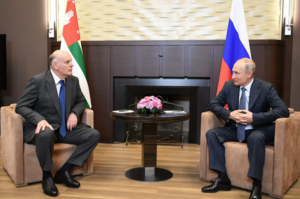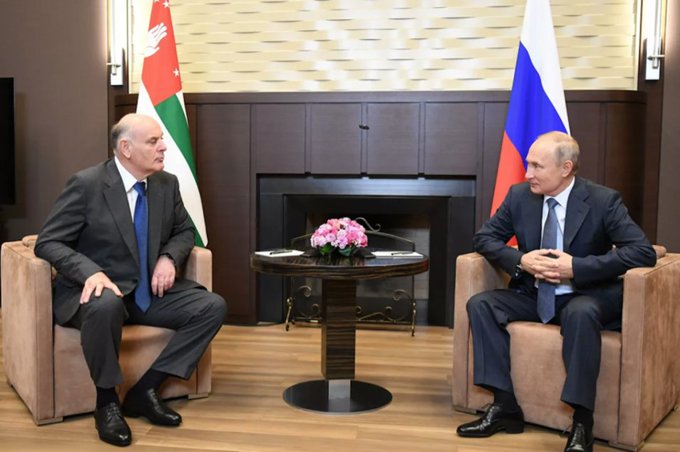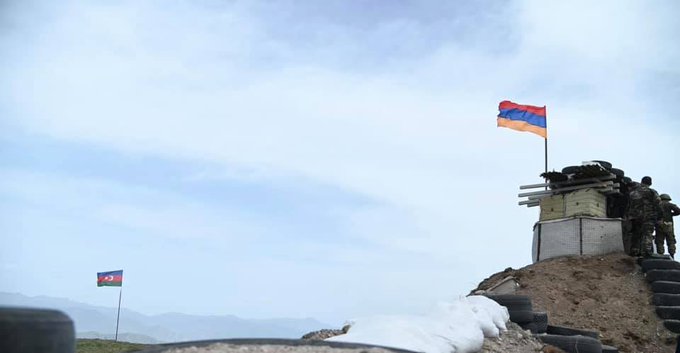Diaspora Politics on Abkhazia: Involved in Half Capacity
President Aslan Bzhania had an important meeting with his counterpart Vladimir Putin on November 12, 2020. With the ongoing global pandemic and subsequent collapse of the tourism sector paired with an energy crisis, Abkhazia has been facing difficult times stabilizing its economy and is in desperate need of external assistance. However, this time the Russian supply came with a remarkable price tag. A set of conditions that Bzhania had to agree upon contained the 45-point list “The Formation of a Common Socio-Economic Space Between the Russian Federation and the Republic of Abkhazia on the Basis of the Harmonization of Legislations”. Many of the demands did not come as a surprise, as discussions over similar issues have been held with former president Sergey Bagapsh as well. Nonetheless, the element of crises puts immense pressure on Abkhazians and leaves little space for maneuvering.

Image: Abkhazian President Aslan Bzhania and Russian President Vladimir Putin, Sochi, November 12, 2020 (Source: RIA Novosti).
If the agreement signed by the Abkhazian President and Prime Minister as well as the Deputy Prime Minister and the Representative of Presidential Administration of Russian Federation will be also ratified then Russian Federation citizens can easily obtain dual citizenship and with this also the right to purchase real estate in Abkhazia. Moreover, the agreement foresees the allowance of Russian companies to establish themselves in the energy system of Abkhazia, and more symbolic demands such as transferring the New Athos Monastery to the Russian Orthodox Church were also laid out. This development drives Abkhazians further into full-scale dependence from Russia that may easily end with absorption. One cannot be entirely sure whether this move will be accepted by a majority in the de facto state. Even if de facto state authorities have their hands tied, they might still opt for diversification of external assistance. Turning to the Abkhaz diaspora in Turkey may offer an alternative, especially in times of crises to circumvent the attempts to tighten Russian grip on this de facto state.
With the forced migration of Circassians in 1864; Abkhazians were settled in two different strategic lines in the Ottoman Empire. First being the line between Sinop and Adana (from Black Sea to the south) and the second being the Istanbul and the surrounding regions. Since then, the Abkhaz diaspora contained their strong ties and had been adamant in keeping their culture and language while also achieving harmony within Turkish society. Today, it is estimated that Turkey hosts some 750,000 Abkhazians. Keeping the relationship within the diaspora alive, especially since the independence claim, Abkhaz diaspora in Turkey has been organized under different non-governmental organizations and a federation consisting of 17 associations all over the Turkey. Organizations provide culture and language courses to ensure the Abkhaz culture does not fade away.
Nowadays, Turkey hosts nearly four times as many ethnic Abkhaz people than the entire population of the de facto state, which gives the diaspora a capacity to exert power over de facto state authorities and processes affecting bilateral economic relations. Even if Turkey shares about 18% of Abkhazian trade turnover, and gradually cultivates its influence in this de facto state, the Abkhaz diaspora in Turkey may neither share the concerns of Abkhaz public nor be fully aware of the details recently discussed by Abkhazian and Russian political leaders. Quite the contrary.
As a dynamic society the diaspora also has strong ties with Abkhazia both economically and politically. Ex-chairmen of the Abkhaz Federation in Turkey, Ahmet Hapat, states that ”every social or political development in Abkhazia is monitored by the diaspora both in individual and organizational level”. The diaspora in Turkey is not only well informed about the developments in Abkhazia, but also has some capacity to influence local politics by different means. The economic and political ties have been strengthened by people who were repatriated in Abkhazia. Moreover, the diaspora also plays a significant role when it comes to the relations between Abkhazia and Turkey. Even though Turkey still does not recognize Abkhazia and has an isolationist stance against this de facto state, the Abkhaz diaspora has its hope for both to change.
The biggest controversy with the common-plan lies in lifting the ban on foreigners to purchase real estate in Abkhazia. Russians and Abkhazians have contradicting opinions on the matter: Abkhazians worry about losing their national identity and Russians are facing problems because of illegal purchases. Even though, it may come with economical upholds, in the public eye in Abkhazia, the issue remains a taboo which most likely leads to internal political turmoil. Keeping in mind the lessons learnt from the predecessors, Aslan Bzhania may try to weaken the ban rather than fully lifting it.
As Hapat stated, the Abkhaz diaspora in Turkey shares the same concern when it comes to lifting the ban on real estate purchases. If ratified, strategic places in Abkhazia may be bought by the foreigners which can later cause greater problems. Therefore, the diaspora can understand the rationale behind the taboo in Abkkhazia. Hapat also added that “lifting the ban on real estate has been on the agenda for years now, yet, Abkhazian governments have always overcome the matter with political maneuvers. With Bzhania ruling the country we are also expecting a similar outcome. No matter what, diaspora will be respectful to any political decision made by the government”.
The regime of international sanctions against Abkhazia has driven this de facto state into isolation and led to Russian dominance in the region; now there are strategic relations maintained between on both sides, much to Russia’s benefit. Turkey, while not shying away of making contacts with Abkhaz de facto authorities on the highest level, could play a balancing role, but it instead has been too cautious not to antagonize Russia. The Abkhaz diaspora in Turkey, while closely following the political dynamics, may ideally lobby for more active Turkish engagement in their ancestors’ homeland, and at the same time exert some leverage on Abkhazian domestic politics. But, in reality, the diaspora does not want to overstep their capabilities. A former government official from Abkhazia has a more relaxed view on the so-called “45-points list” and doesn’t think there will be a drastic shift from previous positions regarding the right for real estate purchase by foreign citizens: “the Abkhazian civil society and the political forces in the parliament will not let it happen in the proposed wording”. When the political intervention of the diaspora is only at half capacity, the other half should come from within.
Authors: Eiki Berg and Emel Almira Sarıoğlu






